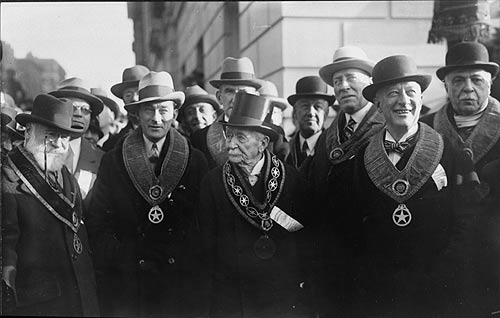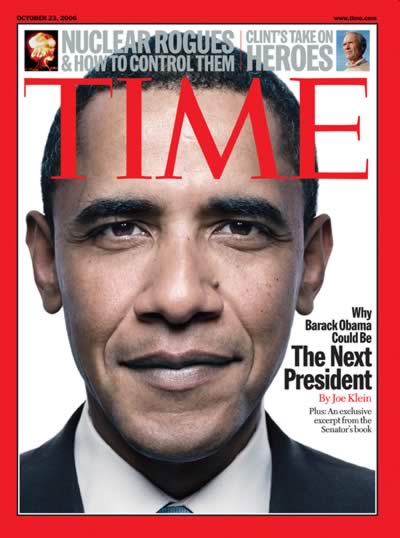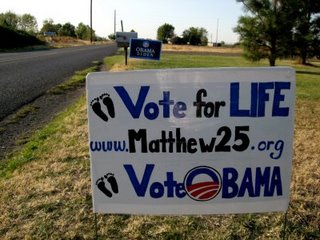 That might be heresy to some in the Catholic universe, but the argument has much to be said for it–though don’t expect Cardinal Edward M. Egan to be making that claim at tonight’s Al Smith Dinner. The quadrennial white-tie gala fundraiser at New York’s Waldorf Astoria is a glitzy affair and a rare combat-free zone on the eve of the presidential vote. That will be especially welcome given the tenor of the current campaign (and one must put the onus on the McCain-Palin camp–there is no “pox on both houses” equivalency here). It will also be tough for the candidates’ speechwriters to come up with the usual jokey banter given the state of affairs in the nation and abroad. If I were Obama, I’d stick with conclave jokes about white smoke coming from McCain’s ears…And maybe David Letterman can give McCain some Top Ten pointers tonight when McCain has his make-up visit to the show after his earlier bailout over the bailout…
That might be heresy to some in the Catholic universe, but the argument has much to be said for it–though don’t expect Cardinal Edward M. Egan to be making that claim at tonight’s Al Smith Dinner. The quadrennial white-tie gala fundraiser at New York’s Waldorf Astoria is a glitzy affair and a rare combat-free zone on the eve of the presidential vote. That will be especially welcome given the tenor of the current campaign (and one must put the onus on the McCain-Palin camp–there is no “pox on both houses” equivalency here). It will also be tough for the candidates’ speechwriters to come up with the usual jokey banter given the state of affairs in the nation and abroad. If I were Obama, I’d stick with conclave jokes about white smoke coming from McCain’s ears…And maybe David Letterman can give McCain some Top Ten pointers tonight when McCain has his make-up visit to the show after his earlier bailout over the bailout…
 But there are at least a couple of ironies here. One is that the political bloodletting in the Catholic Church has reached such a point that a dinner honoring the first Catholic presidential candidate–and a man reviled for his faith–is virtually off-limits to Catholic candidates. For the last Al Smith dinner, in 2004, Cardinal Egan refused to host John Kerry because he is a pro-choice Catholic. Instead he invited former Republican President George H.W. Bush and former New York Gov. Hugh Carey, a Democrat, as this CNS story explains.
But there are at least a couple of ironies here. One is that the political bloodletting in the Catholic Church has reached such a point that a dinner honoring the first Catholic presidential candidate–and a man reviled for his faith–is virtually off-limits to Catholic candidates. For the last Al Smith dinner, in 2004, Cardinal Egan refused to host John Kerry because he is a pro-choice Catholic. Instead he invited former Republican President George H.W. Bush and former New York Gov. Hugh Carey, a Democrat, as this CNS story explains.
Problem is, according to much of the “pro-life” rhetoric, Obama is the most “pro-abortion” candidate EVER, to the point that he supports “infanticide.” (Yes, “scare quotes” are necessary given the nature of allegations.) So how is it that Obama gets to appear and Kerry doesn’t? Putting up a “No Catholics Need Apply” sign at the Al Smith event may be the ultimate paradox.
It wasn’t always so…
…Time was when churchmen and candidates worked together for the Catholic good and the common good, such as when Smith was attacked in The Atlantic Monthly in a open letter by Charles C. Marshall. A reluctant Protestant apologist (he was drafted for the task by the magazine’s editor), Marshall still recycled various dubious claims about Catholicism’s incompatibility with democracy, and Catholics’ standing as loyal Americans, as demonstrated (he said) by various papal encyclicals.
Smith’s first response–possibly apocryphal, but certainly true in a larger sense–was the memorable line, “What the hell is an encyclical?” Rather than castigating Smith (as would happen today), he received help drafting a response from the World War I hero Father Francis Duffy. (Cardinal Patrick Hayes also reviewed Smith’s response and pronounced it “good Catholicism and good Americanism.”) Smith’s actual response re the encyclicals was: “So little are these matters of the essence of my faith that I, a devout Catholic since childhood, never heard of them until I read your letter.”
The second irony is that Obama’s views may certainly be closer to Catholic social justice teachings than McCain’s. (And hey, why didn’t Obama point out in last night’s debate that the Catholic bishops have closer ties to ACORN–to the tune of $1 million in grants–than he does?) His community-based activism and his views on justice and peace are far more consonant with Catholic social teaching than McCain’s. Michael Sean Winters made that argument in The New Republic, and it occasioned a lively debate at Commonweal’s blog.
Moreover, Obama is the first presidential candidate of a prominent minority community and he has faced ugly abuse not only for his race but also for his faith–much as Smith did. Will 2008 be a replay of 1928?
Or, put this way, is Obama the “real” Catholic candidate? Perhaps a useful thought experiment would be this: Imagine that Al Smith had been elected in 1928. Instead, we got Herbert Hoover. And I think you know what came next…
BTW: The photo of Al Smith (second from the left, with the “Sachems of Tammany Hall, 1929, including Mayor James J. Walker”) is courtesy of the Museum of the City of New York, where an excellent exhibit, “New York Catholics: 1808-1946,” organized for the bicentennial of the diocese, continues through the end of this year. It’s worth checking out if you’re in the city.

